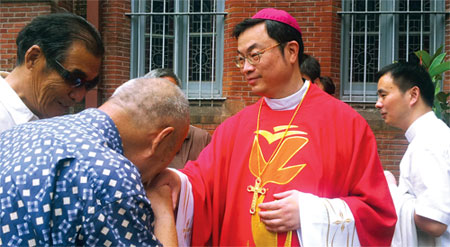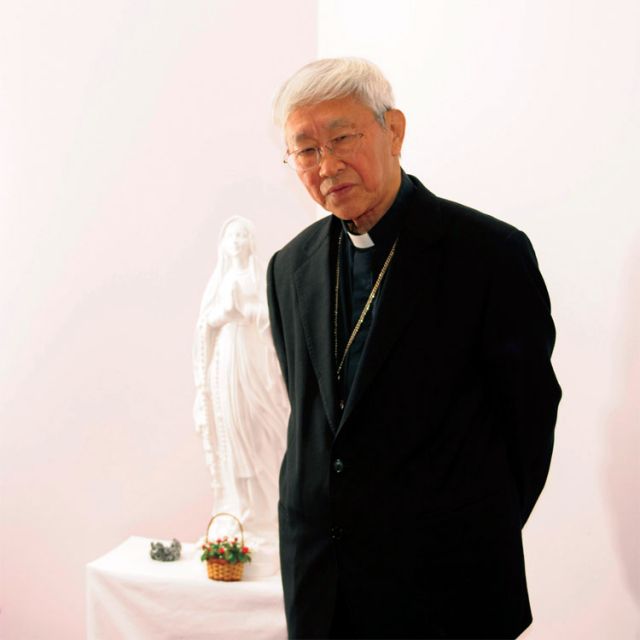Hong Kong's retired Cardinal Joseph Zen warns of an impending schism in the Chinese Catholic Church and blames the Vatican for allowing Communist Party officials to run roughshod over China's bishops.
"For years they (the Communist Party of China) had everything their way. The Holy See adopted a policy of appeasement and compromise," Zen told The Catholic Register while in Toronto to deliver an early February address to Convivium magazine subscribers. "So they were happy that they could control more and more the Catholic Church, and they could make slaves of the bishops."
Chinese Catholics on the mainland are split between the underground Church and officially registered churches, while the Chinese government interferes in the appointment of bishops. There is a serious risk of a Chinese schism, said the cardinal.
"Do you know what I write to the Holy Father?" Zen asked. "I say it is only because of your kindness that the official Church is not called schismatic. It is actually schismatic without being named. It's risking being a schismatic Church with the blessing of the Holy See, because the Holy Father cannot command that Church. The whole command is in the hands of the government."
Zen is aware his warnings lack prudence.
"For a long time I have abstained from talking about the Holy See," he said. "But I think that is unfair. We must be fair to everybody. They (Vatican officials) should take the responsibility."
The Catholic Church in both Shanghai and Wuhan have recently faced off with Chinese government officials.
In Shanghai the coadjutor Bishop Thaddeus Ma Daqin was relieved of all public ministry and had his episcopal appointment revoked by the Chinese episcopal conference — a body not recognized by the Vatican. At his ordination last July, Ma caused government panic when he announced he would step down from his position with the Chinese Patriotic Catholic Association to concentrate on his pastoral ministry as bishop of Shanghai. Faithful in Shanghai's cathedral greeted the announcement with extended applause, but Ma was immediately sent away on a retreat, sequestered in Shanghai's seminary. In December the Bishops' Conference of the Catholic Church of China revoked Ma's Shanghai appointment, which would have seen him eventually become bishop of Shanghai. The bishops' conference also let it be known that for all future appointments "a pledge of loyalty" would be required.
It's obvious that the bishop's conference is controlled by the State Administration for Religious Affairs, which also founded the Chinese Catholic Patriotic Association in 1957, said Zen.
"You can see all the presidents and vice presidents, both in the patriotic association and the so-called bishops' conference — they are all slaves of the government," said Zen. "There are some illegitimate, some legitimate (bishops), but they are all on the side of the government."
In Wuhan, State Administration for Religious Affairs officials have stepped in to cancel a pastoral plan that would have reorganized the diocese with priests shuffled among parishes. Zen warns that the next step will be for the government to impose a government-appointed bishop on Wuhan without Vatican approval. The Wuhan seminary has been closed and Chinese Catholic Patriotic Association officials are turning away seminary candidates, Zen said.
China and the Vatican have clashed over the appointment of bishops since shortly after Communist Party Chairman Mao Ze Dong declared the new People's Republic in 1949. In the mid-1950s China's new government discovered that the monarchy in Portugal retained the right to recommend bishops for China to the Holy Father. The new Chinese administration viewed this arrangement as clearly colonial interference in the internal affairs of China.
China's government declared it would henceforth exercise the powers of the Portuguese crown in appointing bishops. However, under Pope Pius XII the Holy See refused to acknowledge the communist government. For many years there were simply no appointments. Then during the Cultural Revolution of the 1960s and '70s, many Catholic bishops were accused to being counter-revolutionaries in league with foreign powers. The bishops found themselves in re-education camps and prisons.
Throughout this period the Communist Party of China promoted the "Three Self " principles in religious affairs. Rooted in Protestant missionary work in China before the turn of the 20th century, the Three Self movement promoted self-governance, self-support and self-propogation. It meant that Chinese churches should operate without financial support from outside China and that evangelization should be the work of Chinese themselves.
It's not the Three Self principles themselves that inhibit the Catholic Church in China, said Zen.
"You can practise the Three Self principles in a decent way," Zen said. "Now they practise in an indecent way. They impose an imperial command on the Church. They are treating the bishops as slaves. They just bring them here or there like dogs on a chain."
The principles presume the Church in China is independent enough to govern itself without government oversight.
"This is not possible without the internal witness in the Church. The Holy See has a long policy of compromise and in China there are weak people in the Church," Zen said.
Zen dismisses the Chinese government insistence on assuming the powers of the Portuguese crown as a mere pretext for communist control. When the king of Portugal proposed bishops for China it was a Catholic king of a Catholic country advising the pope, who was free to make his own choice.
"Under an atheist government, how can you accept bishops proposed by the government? It's ridiculous," said Zen.

A well-wisher kisses the ring of Auxiliary Bishop Thaddeus Ma Daqin following his episcopal ordination at St. Ignatius Cathedral in Shanghai in July 2012. Ma gave up his duties with China's Catholic Patriotic Association, which led to his appointment as bishop being revoked.
CNS photo/courtesy of UCAnews
The situation of the Church in China varies from region to region, said Scarboro Missions moderator Fr. Brian Swords. Swords spent nearly 20 years teaching English inside China.
While government officials obsess over bishops and Church administration in some regions, ordinary Chinese Catholics in much of the country are strong and joyful in their faith, said Swords.
"There's a willingness and an openness to share their faith with other people. I would say there is less fear. They wouldn't be that fearful," he said.
Swords' many teaching appointments included a period in Urumqi, capital of the heavily Muslim autonomous region of Xinjiang. Beijing's constant monitoring of Muslims in the region has an effect on Catholics.
"The Catholics there, their faith was stronger too," recalled Swords. "Because of one's suffering the other picks up vibes and is, I think, blessed in a way."
The government's greatest tool of control over the Chinese hierarchy is its ability to keep priests and bishops in an economically fragile circumstance.
Swords points out how parish priests lack medical plans and pensions and therefore can't leave their diocese or parish without risk.
The faith is rooted in China through Chinese priests and lay people, said Zen.
"The hope is in the faithful and in the priests, provided we don't disappoint them too long," said the cardinal. "The faithful, the majority of priests, are still OK. If they keep their faith then we have a future. The priests can help their bishop, they can convert their bishop, not easily but there is a hope."

